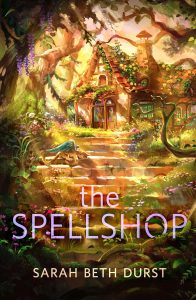The Spellshop by Sarah Beth Durst: Review by Colleen Mondor
 The Spellshop, Sarah Beth Durst (Bramble 978-1-250-33397-1, $29.88, 384pp, hc) July 2024.
The Spellshop, Sarah Beth Durst (Bramble 978-1-250-33397-1, $29.88, 384pp, hc) July 2024.
Author Sarah Beth Durst notes in her Acknowledgements to The Spellshop that writing her novel was sparked by hot chocolate and raspberry jam and a desire for “a book that felt like a warm hug.” (I get that sentiment because boy howdy, 2024 has been some kind of tough for a lot of us.) Plenty of pastries make appearances in the narrative, and raspberry jam actually proves to be quite important, but this gentle magical romance also raises some prescient questions about who should have access to knowledge and what good governance is for. Durst accomplishes her cozy goal with ease, but don’t dismiss The Spellshop as light reading. (In fact, let’s not even dismiss “light reading.”) The story of a runaway librarian and her sentient spider plant(!) has a lot to tell readers about right and wrong and why community matters. There is also the saving of a merbaby, the care of some merhorses, the building of shelves for raspberry jam, and a lot of spellbook research to save ailing magical trees. So yes, The Spellshop feels like a warm hug, but in the middle of all that are a few strong left hooks at a monarch who isn’t paying attention to his subjects and some rebels who don’t quite get the message about good governance either.
Kiela is a librarian in her country’s capital city which, as the novel opens, is under attack from a rebellion fueled by frustration at the government’s tradition of maintaining strict control of access to magic. Spells are performed only by certain approved wizards, a group that has become increasingly small over the years. Punishment for violating the rules on spellwork is harsh and many more distant areas of the country, particularly its outer islands, have suffered as those in power have become increasingly stingy about when spellmaking can occur. While Kiela was aware of all this, it had little impact on her life, which was spent entirely (living and working) in the great library. When the war arrives at her doorstep, she is shocked; the other librarians have long fled without even taking the time to warn her. Kiela had been crating up books to potentially send out to safer locations when, suddenly, along with her assistant Caz (the aforementioned sentient spider plant) she has to jump on a boat with her literary stash and save herself. In due time she arrives at Caltrey, the island where she lived as a child. Back in her parents’ cottage, Kiela settles into village life but she soon realizes that magic is desperately needed in Caltrey, and so she opens the books and gets to learning what has long been forbidden.
Durst tosses into the narrative a brewing romance with a childhood friend, the development of all sorts of new friendships and, as Kiela wanders about the island, the sort of coming-of-age novel for adults that anyone who has started over will appreciate. But there is also the constant threat of discovery hanging over anyone who uses magic and the evident frustration (which on the mainland sparked the rebellion), among Caltrey’s inhabitants about all they lost by not maintaining their own magical knowledge. Here is a passage that stayed with me:
“We didn’t think we’d need it,” Halio said. “The emperor’s sorcerers always came, with spells so much grander than our homespun ones. The older generation was happy to leave the spellcraft for the experts, and the experts were eager to insist their way was best. And then some fluffed-up bureaucrats in the capital with no knowledge of the outer islands or how the world’s interconnected codified that into law, and, well, where does that leave us now?”
There is no question that The Spellshop strongly succeeds as romantasy, and Durst’s many fans will love it. But its subversive political elements have stayed with me long after the sweetness of Kiela’s moments with books and jam. The author is sending a message with this book, and it’s one we should be listening to; it also fits perfectly with the best of science fiction and fantasies with strong anti-authoritarian impulses.
Interested in this title? Your purchase through the links below brings us a small amount of affiliate income and helps us keep doing all the reviews you love to read!
This review and more like it in the December 2024 issue of Locus.
 While you are here, please take a moment to support Locus with a one-time or recurring donation. We rely on reader donations to keep the magazine and site going, and would like to keep the site paywall free, but WE NEED YOUR FINANCIAL SUPPORT to continue quality coverage of the science fiction and fantasy field.
While you are here, please take a moment to support Locus with a one-time or recurring donation. We rely on reader donations to keep the magazine and site going, and would like to keep the site paywall free, but WE NEED YOUR FINANCIAL SUPPORT to continue quality coverage of the science fiction and fantasy field.
©Locus Magazine. Copyrighted material may not be republished without permission of LSFF.







